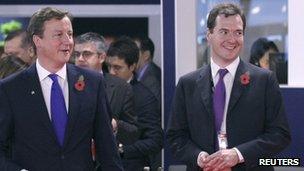G20: Watching their smartphones
- Published
- comments

Chancellor George Osborne (R) says there is a real sense of urgency at the G20 summit in Cannes
Will he resign or not? Will there be a referendum or not? Will the Greeks stay in the eurozone or not? All questions with a profound impact on the global economy. All questions that could not be answered inside the meeting of leaders of the world's largest economies who were forced to peer at their smartphones to learn the latest news coming from Athens.
The Chancellor George Osborne says that there is a real sense of urgency in the room and an acceptance of the need for specific action. That means that by tomorrow he wants to see a figure for enhanced IMF funding big enough to reassure the markets that the international community will stand behind any future member of the eurozone who hits trouble. Asked whether the British taxpayers should be lending money via the IMF to eurozone countries he replied that the taxpayers of China or America or Brazil or Guatemala could ask the same question.
The specific action that the G20 want is the assurance that Greece will - despite all the dramatic to'ing and fro'ing of the last 48 hours - sign up to last week's rescue package.
None of this will satisfy those Conservative backbenchers who wanted to see a referendum in Greece and the country choosing to leave the euro.
In the Commons, the Treasury Minister Mark Hoban was asked if the government had contingency plans for the collapse of the euro. This government, he replied, is well prepared for any eventuality - except one, to the delight of Eurosceptics: "I don't think there is any intention for us to join the euro at the time when it is breaking up."
Whether in Westminster or Cannes they are waiting and watching and wondering what on earth could happen next.